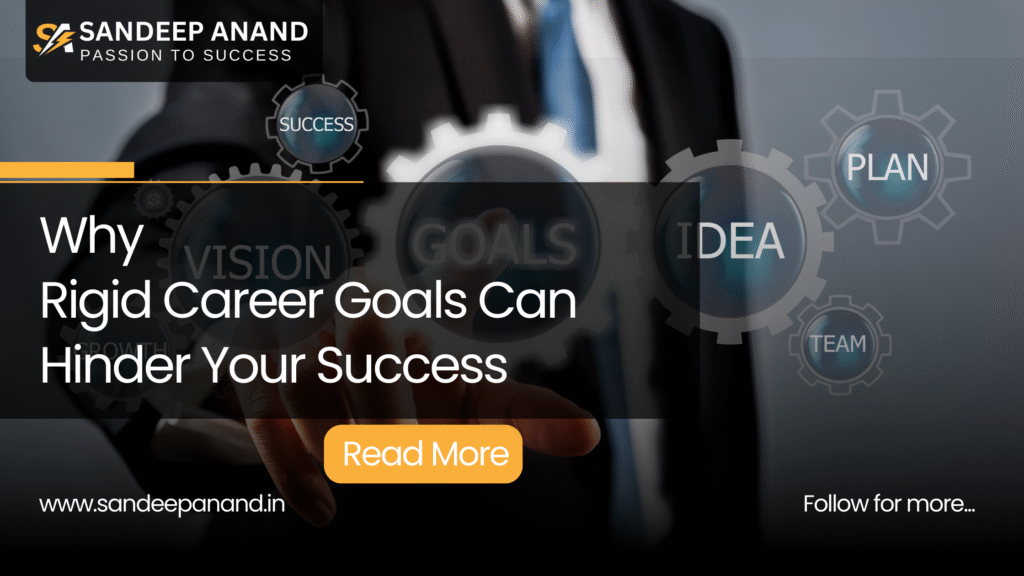In today’s fast-paced professional world, setting rigid career goals often seems like the key to success. However, while having a clear direction is essential, overly strict objectives can stifle growth, limit opportunities, and create unnecessary stress. By embracing flexibility, professionals can adapt to changes, seize unexpected possibilities, and achieve long-term success. This blog explores why rigid career goals can hold you back and how adopting a more adaptable approach can transform your career trajectory. Let’s dive into the reasons why loosening your grip on fixed goals can unlock your true potential.
The Pitfalls of Rigid Career Goals
Rigid career goals can create a tunnel-vision mindset. When you fixate on a specific job title, salary, or timeline, you may overlook alternative paths that could lead to greater fulfillment. For instance, many professionals set their sights on a particular role, only to find that industry trends shift or personal priorities evolve. Consequently, they feel trapped or frustrated when their plans don’t unfold as expected.
Moreover, rigid goals can discourage risk-taking. If you’re laser-focused on a predefined outcome, you might avoid unconventional opportunities, such as a lateral move or a new industry, that could broaden your skill set. In contrast, professionals who remain open to change often discover innovative ways to grow. By prioritizing adaptability over strict milestones, you position yourself to thrive in an ever-changing job market.
How Rigid Career Goals Limit Flexibility
Flexibility is a critical asset in today’s dynamic workforce. However, rigid career goals often undermine this quality. When you lock yourself into a specific plan, you may resist pivoting when circumstances change. For example, technological advancements or economic shifts can render certain roles obsolete. If your goals are inflexible, you might struggle to adapt, leaving you at a disadvantage.
On the other hand, professionals who embrace flexibility can pivot seamlessly. They view setbacks as opportunities to reassess and explore new directions. As a result, they’re better equipped to navigate challenges and capitalize on emerging trends. By loosening your attachment to rigid career goals, you create space for growth and resilience, ensuring you remain competitive in any environment.
The Stress of Chasing Fixed Milestones
Another drawback of rigid career goals is the stress they generate. When you tie your self-worth to achieving specific outcomes, every setback feels like a personal failure. This pressure can lead to burnout, anxiety, or a lack of motivation. For example, if you aim to become a manager by age 30 but miss that milestone, you might question your abilities, even if you’ve made significant progress.
In contrast, a flexible approach reduces stress by focusing on progress rather than perfection. By setting broad objectives, such as improving leadership skills or expanding your network, you allow room for unexpected detours. Consequently, you maintain a healthier mindset and sustain long-term motivation. Ultimately, letting go of rigid career goals fosters a more balanced and fulfilling professional journey.
Why Adaptability Outshines Rigid Career Goals
Adaptability is a cornerstone of career success in the modern era. Unlike rigid career goals, which can box you into a narrow path, adaptability encourages exploration and growth. Professionals who prioritize learning and versatility often outperform those who cling to fixed plans. For instance, a software developer who learns new programming languages or explores adjacent fields like data science is more likely to stay relevant than one who focuses solely on a single skill.
Furthermore, adaptability aligns with the unpredictable nature of today’s job market. Industries evolve rapidly, and new opportunities emerge unexpectedly. By staying open to change, you position yourself to seize these possibilities, whether it’s a new role, a side project, or a career pivot. In short, adaptability empowers you to thrive in uncertainty, making it a far more valuable asset than rigid career goals.
Balancing Structure with Flexibility
While rigid career goals can hinder progress, completely abandoning structure isn’t the answer. Instead, the key lies in balancing structure with flexibility. Setting broad, adaptable goals allows you to maintain direction without feeling constrained. For example, instead of aiming to become a marketing director by 35, focus on developing skills like strategic thinking or data analysis, which can open multiple doors.
Additionally, regularly reassessing your goals ensures they align with your evolving priorities. Life circumstances, such as starting a family or discovering a new passion, can shift your perspective. By periodically reflecting on your objectives, you can adjust your path without losing sight of your aspirations. This balance keeps you motivated while allowing room for growth and exploration.
How to Shift Away from Rigid Career Goals
Transitioning from rigid career goals to a more flexible mindset requires intentional effort. First, start by identifying the core values driving your ambitions. Are you seeking financial stability, creative freedom, or personal growth? Understanding your “why” helps you set meaningful yet adaptable goals that align with your priorities.
Next, embrace a growth-oriented mindset. Instead of fixating on specific outcomes, focus on acquiring skills, building relationships, and staying curious. For instance, attending industry conferences or taking online courses can expose you to new ideas and opportunities. By prioritizing learning over rigid milestones, you create a foundation for long-term success.
Finally, practice resilience. Career paths are rarely linear, and setbacks are inevitable. Rather than viewing challenges as failures, see them asunless they’re part of the process. When you encounter obstacles, treat them as learning experiences. By adopting this mindset, you’ll be better equipped to handle uncertainty and embrace new possibilities.
Real-Life Examples of Flexible Career Success
To illustrate the power of flexibility, consider the career of Satya Nadella, Microsoft’s CEO. Early in his career, Nadella didn’t have a rigid plan to lead a tech giant. Instead, he focused on continuous learning and adapting to new challenges. His willingness to explore diverse roles within Microsoft allowed him to develop a broad skill set, ultimately positioning him for leadership. Similarly, professionals who pivot to new industries or roles often find success by leveraging transferable skills and staying open to change.
Another example is J.K. Rowling, who transitioned from teaching and secretarial work to becoming a global literary icon. Her career path was far from linear, but her adaptability and persistence led to the creation of the Harry Potter series. These stories highlight how letting go of rigid career goals can lead to extraordinary outcomes.
Practical Tips for Embracing Flexible Career Goals
To incorporate flexibility into your career, try these actionable steps:
- Set Process-Oriented Goals: Focus on habits and skills, such as improving communication or mastering a new tool, rather than specific titles or salaries.
- Stay Curious: Seek out new experiences, whether through side projects, volunteering, or networking. These activities can spark unexpected opportunities.
- Embrace Feedback: Use constructive criticism to refine your approach and identify areas for growth.
- Diversify Your Skills: Learn complementary skills that enhance your versatility, such as project management or public speaking.
- Reflect Regularly: Schedule time to evaluate your goals and ensure they align with your current values and circumstances.
By implementing these strategies, you’ll build a resilient, fulfilling career and be open to endless possibilities.
Conclusion: Unlock Your Potential with Flexible Career Goals
Rigid career goals may provide a sense of direction, but they can also limit your potential and create unnecessary stress. By embracing adaptability, balancing structure with flexibility, and focusing on growth, you can confidently navigate the complexities of the modern job market. The professional world is full of surprises, and those who remain open to change are best positioned to seize them. So, let go of the need for a perfect plan and start building a career that evolves with you. Your future self will thank you.
Start your journey to a fulfilling future because the answers you seek are already within you. Click here to get the right guide.
What’s the One Skill You’re Missing That Employers Can’t Ignore? Discover how adaptability can transform your career and get practical tips to master it now at Best Career Coach Tips.



